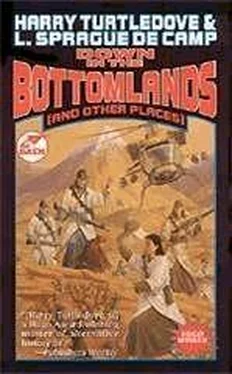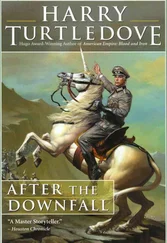Those eyes, like an old hawk’s, lifted from the paper. “Why should I not?” Uthman said. “Even pagans may produce worthy thoughts. Surely the Greeks did. For all their wisdom, though, they burn in hell.” He read on, dismissing Park from consideration. Park glared at his turban, but did not interrupt again.
Finally Uthman set down the sheets. “So,” he said, “you claim the Tawantiinsuujans are People of the Book and not pagans?”
“Yes, excellent qadi ,” everyone said together.
“From this, I might even believe it, but for one thing,” Uthman said.
“What?” Park asked, wondering how he would have to finagle with the shari’a next.
“This book is no Book.” Uthman tapped the pages with a skinny finger. “It is but one man’s belief written out, not a true holy text like the Torah or the Gospels or the perfect book, the Qu’ran. Let the Tawantilnsuujan priests accept it and I could do the same.” His laugh told how likely he thought that was.
Park winced. The qadi had a point, one that could be stressed if the Emirate wanted to go on reckoning the Tawantiinsuujans pagans, wanted an excuse to fight their neighbors whenever they got the whim. “How fares the war, excellent qadi ?” he asked tensely. If the Muslims were winning-
But Uthman did not start to gloat. “Many souls have mounted to paradise, martyrs in the jihad ,” he said. “On this earthly plane-” which he obviously thought of smaller importance “-gains are small on either side.”
“Then urge the Emir to call a truce,” Ankowaljuu said. “He loses little, and may gain much. Consider — perhaps we will be less harsh to the Muslims in our land if you stop tormenting those who follow Patjakamak in yours.
“If they are People of the Book, you may honorably stop tormenting them,” Park added.
Uthman ibn Umar plucked at his beard. “Let it be so,” he said at last. “I think you will fail in your effort, thus showing that Tawantiinsuuju’s faith truly is pagan. But if I am in error, if revelation did reach you in the ancient days, I would be sinning if I denied you the chance to prove it. Wait here. I shall speak to the Emir.” He rose, tottered out of the tent.
A squad of soldiers soon appeared to take charge of Park and his companions. They led them to a bigger, fancier tent. One of the soldiers frisked them, quickly and efficiently, before they were allowed inside. A servant shouted, “Bend yourselves before the mighty Emir Hussein, beloved of Allah!”
Ankowaljuu and Waipaljkoon prostrated themselves as they might have before the Son of the Sun. Park and, following his lead, Eric Dunedin bowed from the waist. “Rise,” Hussein said. “Uthman tells me you have a curious tale for me. I would hear it.”
Hussein was not what Park had imagined an emir would be. He was short and thin and wore glasses. In the dark green uniform of the Dar al-Harb, he looked more like a corporal from the typing pool than a ruler.
He thought like a ruler, though. He proved that at once, asking, “Judge Scoglund, if I agree to seek a truce so you can try to show that the Tawantiinsuujans are in fact People of the Book, what is the advantage for me?”
Park carefully did not smile, but he felt like it. He approved of people who got down to brass tacks. He said, “If the followers of Patjakamak are People of the Book, you do not need to persecute the ones in your land any more. Make them pay jizya instead.”
“The tax for the privilege of keeping their religion in peace, eh?” Behind the lenses of his spectacles, Hussein’s eyes grew calculating. He was figuring out how much the tax would bring, Park thought — probably down to the last copper. He must have liked the sum, for he said, “Aye, that is interesting. What else?”
“If you stop persecuting those who worship Patjakamak, the Tawantiinsuujans likely will go easy on their Muslims. That gives you both one less thing to fight about.”
“This could be so.” Hussein was a cool one, all right. He steepled his fingers — a hell of a thing, Park thought, for a Muslim to do. “What else?”
“Damn,” Park muttered. If all that wasn’t good enough — He racked his brains. At last, carefully, he said, “Lord Emir, how do you feel about your ghazi raiders?”
“Why?” Hussein was cautious too, revealing nothing.
“If you want to be without them, hope the Tawantiinsuujans do show they are People of the Book. Then ghazis will have less excuse to come to your country from overseas, and you will not need to worry so much about what so many ruffians running around loose in your land may do.”
He wondered if he’d gone too far. But hell, if he were running a country, the last thing he’d want in it was a bunch of gangsters and terrorists, no matter how holy their motives were. He just hoped Hussein thought the same way.
The Emir said, “They are men given over to Allah,” and Park was sure he’d stuck his foot in it. Then Hussein went on, “But it is true, they are sometimes difficult to control.” Park breathed again. Hussein finished, “I will try to arrange a truce, then, of ten days’ time. If you fail, we fight again.”
“What if I don’t?” Park said. “What if I do what I say?” Hussein stared at him. “Do you challenge me?”
“Only this far — if I succeed, do as you agreed to do before this stupid war started: accept my settlement of your dispute with Tawantiinsuuju. Do it on the spot, right here, right now — or then, I mean.”
“You do not lack courage,” the Emir said slowly.
“Or gall,” Uthman added.
Park only waited. Now he grinned. Finally Hussein said, “We have a bargain.” After that, Park did prostrate himself. Hussein, he figured, had earned it.
Neither the Moorish officers who escorted Park and his companions across the line of battle nor the Tawantiinsuujans who received them seemed to have much faith in the green-and-white-striped flags of truce both sides bore. The two parties hastily separated from each other; members of both kept looking back over their shoulders to make sure no foe was going for a weapon.
“Is the truce holding?” Park asked the Skrelling soldier next to him.
“So far,” the Tawantiinsuujan replied. “Who knows how far we can trust the cursed Sun-deniers, though?” Park knew the men of the Dar al-Harb were saying the same thing about Tawantiinsuuju. He also knew that telling the soldier so would do no good.
A very young Tawantiinsuujan officer tried to take charge of the newcomers as soon as they were out of air-rifle range of the front line. “Come with me,” he said. “I want to get a complete written record of everything you saw and did while under the control of the forces of the Emirate.”
“No,” Ankowaljuu said.
“Hell, no,” Park agreed.
“But you must,” the lieutenant said. “Proper procedure requires-”
Ankowaljuu said, “Aka to your proper procedure, boy. I am tukuuii riikook to the Son of the Sun. Proper procedure is what I say it is.” He produced the documents that proved he was what he claimed. The young officer’s eyes got big as he read them. He put a hand over his eyes, as if Ankowaljuu were the Son of the Sun himself. “Better,” the tukuuii riikook nodded. “Now get us moving toward Maita Kapak, so I can carry out my duties.”
Within ten minutes, Park found himself bucking along in a goodwain different from one of the Emirate’s only in the color of its canvas top and that of the accompanying soldiers’ uniforms. “I admire the efficiency,” he said to Ankowaljuu, “but I wish the ride were smoother.”
“You mean you want peace and kidneys both?” Ankowaljuu exclaimed, as if he was asking much too much.
Читать дальше












